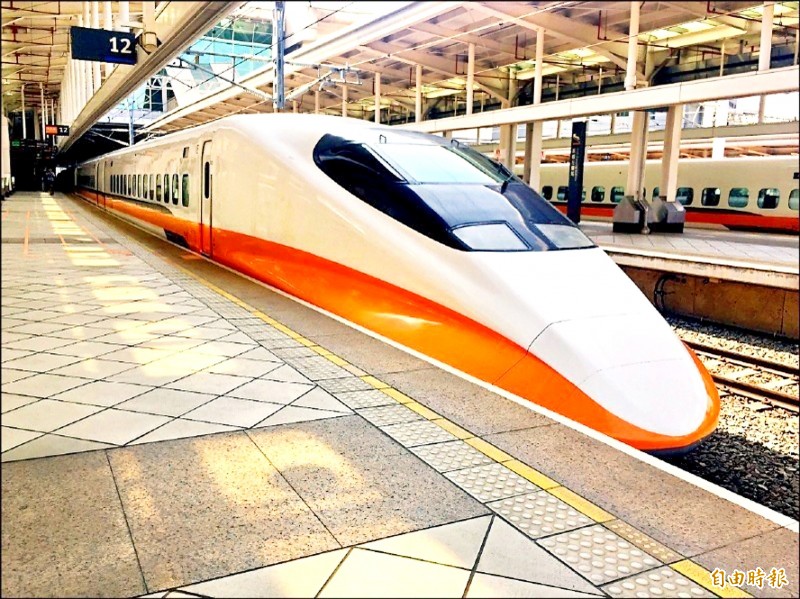《TAIPEI TIMES》 HSR extension to Yilan planned

A Taiwan High-Speed Rail train stands next to a platform in an undated photograph. Photo: Ling Ching-lun, Taipei Times
SOLVING TRAFFIC CONGESTION: If the high-speed rail is extended, 14,400 to 18,000 people per hour would be able to travel to Yilan in an estimated 13 minutes
By Shelley Shan / Staff reporter
Minister of Transportation and Communications Lin Chia-lung (林佳龍) yesterday confirmed that the government is planning to extend the high-speed rail (HSR) line to Yilan County, at a cost of nearly NT$100 billion (US$3.27 billion).
Lin spoke about the project before attending a meeting of the Legislative Yuan’s Transportation Committee, at which lawmakers were scheduled to review the Railway Bureau and Taiwan Railways Administration’s (TRA) budget for fiscal 2019.
“Our preliminary evaluation showed that the project is feasible, but we still need to carefully review different aspects of the project, from the method and technology that would be used in the construction, the project’s effects on the environment and funding for the project to the economic benefits that it would generate,” Lin said.
People have been complaining about the difficulties of purchasing railway tickets to the east coast, and the high-speed rail extension line to Yilan would help resolve this problem, Lin said.
Congestion inside the Hsuehshan Tunnel (雪山隧道) on the Chiang Wei-Shui Freeway (National Freeway No. 5) during major national holidays would also be eased should the high-speed line be extended to Yilan, he said.
Extending the line to Yilan, as well as Pingtung County, would better connect the railway systems on the west and east coasts, making it possible for people to travel around the nation within six hours, Lin said.
The railway network would help balance development in different regions, he said, adding that it would help boost tourism and other industries across the nation.
The TRA operates the railway route connecting Taipei and Yilan, which passes through the nation’s northeast coast and is about 87.5km long.
In addition to the high-speed rail extension line, the bureau said that it is also considering another express railway line connecting Taipei and Yilan, which would also be operated by the TRA.
However, the express railway service would be built along a different route, which would reduce the distance to 50.9km.
If this route is chosen for the express railway line, it would help shorten the estimated travel time from 58 to 27 minutes, the bureau’s assessment showed.
The current railway line and the new one could jointly serve up to 7,200 railway passengers per hour, the bureau said.
It would cost about NT$66.83 billion to construct the new route, it added.
In contrast, if the high-speed rail line was extended from Taipei’s Nangang District (南港) to Yilan, the route would be a little less than 50km, with the estimated travel time further shortened to 13 minutes, the bureau said.
The service capacity, on the other hand, would be between 14,400 and 18,000 passengers per hour, it added.
However, the construction cost would surge to NT$95.5 billion, bureau data showed.
The planned TRA route or high-speed rail extension line would both pass through the catchment area for the Feitsui Reservoir (翡翠水庫), the main water supply for Taipei and New Taipei City.
The high-speed rail extension line would have a smaller environmental impact than the proposed TRA route, as the former has a shorter section passing through the reservoir’s catchment area, the bureau said, adding that fewer people would have to be relocated.
Bureau Director-General Allen Hu (胡湘麟) said that the project would first have to be approved by the National Development Council and an environmental impact assessment (EIA) committee.
Even if permission was granted, it would take another nine to 10 years to complete construction, he said.
The high-speed rail extension line project was warmly received by Democratic Progressive Party (DPP) legislators Chen Ou-po (陳歐珀) and Hsiao Bi-khim (蕭美琴), representing the Yilan and Hualien electoral districts respectively.
Hsiao said that people who are concerned about the environment should support this project, because railway transportation produces less pollution than driving.
DPP Legislator Yeh Yi-jin (葉宜津) and People First Party Legislator Lee Hung-chun (李鴻鈞) questioned how the government would fund the construction.
Lee also asked if the government would still have money to upgrade the high-speed rail system if it spends money from the High-Speed Rail Construction Fund on the project.
Chinese Nationalist Party (KMT) Legislator Yen Kuan-hen (顏寬恆) said that the nation just observed the one-year anniversary of the Puyuma Express derailment in Yilan, which killed 18 people.
Although the Executive Yuan has identified 144 contributing factors behind the accident, only about 20 percent of them have been addressed, Yen said.
“I wonder why this administration would rather waste money on high-speed extension lines to Yilan and Pingtung, or subsidies for people going on fall and winter tours around the country, than spending it on improving the operations of the TRA,” he said.
新聞來源:TAIPEI TIMES












